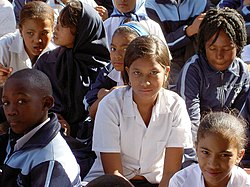
Back Onderwys in Suid-Afrika Afrikaans التعليم في جنوب إفريقيا Arabic Système éducatif en Afrique du Sud French Pendidikan di Afrika Selatan Malay Educação na África do Sul Portuguese Uburezi bwo muri Afurika y’Epfo Kinyarwanda Utbildning i Sydafrika Swedish Thuto mo Aforika Borwa Setswana Imfundo eMzantsi Afrika Xhosa
| Department of Basic Education Department of Higher Education and Training | |
|---|---|
| Minister of Basic Education Minister of Higher Education, Science and Technology | Angie Motshekga Blade Nzimande |
| National education budget (2022) | |
| Budget | R405 3 billion [1] |
| General details | |
| Primary languages | South African Languages English |
| System type | Public, Private |
| Literacy (2007) | |
| Total | 88.72% [2] |
| Male | 90.72% [2] |
| Female | 87.04% [2] |
| Enrollment | |
| Total | n/a |
| Primary | n/a on stats SA |
| Secondary | n/a on stats SA |
| Post secondary | n/a on stats SA |
Educational Systems in S.A

Education in South Africa is governed by two national departments, namely the Department of Basic Education (DBE), which is responsible for primary and secondary schools, and the Department of Higher Education and Training (DHET), which is responsible for tertiary education and vocational training. Prior to 2009, both departments were represented in a single Department of Education. Among sub-Saharan African countries, South Africa has one of the highest literacy rates.[3] According to The World Factbook - Central Intelligence Agency as of 2019, 95% of the population aged from 15 and over can read and write in South Africa were respectively literate.[3][4]
The DBE department deals with public schools, private schools (also referred to by the department as independent schools), early childhood development (ECD) centres, and special needs schools. The public schools and private schools are collectively known as ordinary schools, which are roughly 97% of schools in South Africa. Unlike in most countries, many public schools charge tuition (referred to as fees). No-fee schools were introduced on a limited basis in 2007.[5][6]
The DHET department deals with further education and training (FET) colleges now known as Technical and Vocational Education and Training (TVET) colleges, adult basic education and training (ABET) centres, and higher education (HE) institutions.
The nine provinces of South Africa also have their own education departments that are responsible for implementing the policies of the national department and dealing with local issues.
In 2010, the basic education system comprised 12,644,208 learners, 30,586 schools, and 439,394 teachers.[7] In 2009, the higher education and training system comprised 837,779 students in HE institutions, 420,475 students in state-controlled FET institutions and 297,900 in state-controlled ABET centres.[8]
In 2013, the South African government spent 21% of the national budget on education. Some 10% of the education budget is for higher education.
The Human Rights Measurement Initiative (HRMI)[9] finds that South Africa is fulfilling only 57.1% of what it should be fulfilling for the right to education based on the country's level of income.[10] HRMI breaks down the right to education by looking at the rights to both primary education and secondary education. While taking into consideration South Africa's income level, the nation is achieving 70.8% of what should be possible based on its resources (income) for primary education and 80.9% for secondary education, but 19.6% in general for education quality.[10]
- ^ "Budget Speech 2022: Expenditure on education". 2022-02-23.
- ^ a b c "South Africa - Literacy rate".
- ^ a b "Literacy - the World Factbook".
- ^ Engelbrecht, Petra (2006-09-01). "The implementation of inclusive education in South Africa after ten years of democracy". European Journal of Psychology of Education. 21 (3): 253. doi:10.1007/BF03173414. ISSN 1878-5174.
- ^ [≈http://www.etu.org.za/toolbox/docs/government/schoolfees.html "Education Policy: School Fees"]. Etu.org.za. Retrieved 2017-08-27.
{{cite web}}: Check|url=value (help) - ^ "Free schooling for five million - SouthAfrica.info". www.southafrica.info. Archived from the original on 2013-01-28.
- ^ "Photographic image". Education.gov.za. Archived from the original on 2015-09-28. Retrieved 2017-08-27.
- ^ "Archived copy". Archived from the original on 2013-09-27. Retrieved 2013-05-02.
{{cite web}}: CS1 maint: archived copy as title (link) - ^ "Human Rights Measurement Initiative – The first global initiative to track the human rights performance of countries". humanrightsmeasurement.org. Retrieved 2022-03-27.
- ^ a b "South Africa - HRMI Rights Tracker". rightstracker.org. Retrieved 2023-08-07.
© MMXXIII Rich X Search. We shall prevail. All rights reserved. Rich X Search